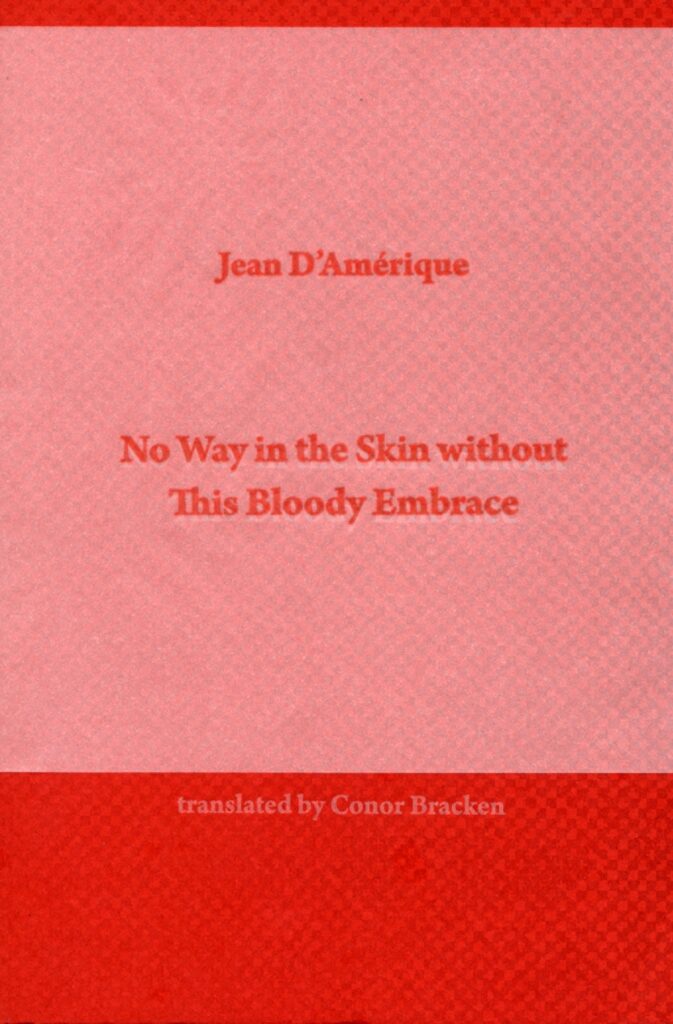And when your music deserts me, words burn-
ish me. The sentence of my skin trails off.
All the while outside anonymous bodies search
for embraces to name. All the while outside havoc
hacks a path before its name arrives. And me, I buff
the gulag of words.

No Way in the Skin without This Bloody Embrace
Jean D’Amérique
Translated by Conor Bracken
September 2022
an ambitious challenge to obscurity, penned by one of Haiti's brightest stars.
Nathan H. Dize
In Jean D’Amérique’s book-length poem, each page is as brief as a hurricane’s eye, glimpsing the eerie territory his speaker traverses like an apocalyptic flâneur. His “body / a devastation inventory,” his stroll a “walk / to curse the sidewalks,” he peers into the ruins—left by the winds of colonialism, capitalism, war, and natural disaster—and sees a “crop of eyes” peering back. What others dismiss as broken, for D’Amérique, is a mirror in shards, “drinking up all the world’s rot / then spilling it all out in diamantine rays.” The first of his books to appear in English, this work reclaims the visceral potency of poetry—it is food, it is “collars of blood,” it is a garment sewn with “a thread of sobs.”
Finalist for 2023 PEN Award For Poetry in Translation.
About the Author
Born in Haiti in 1994, Jean D’Amérique is a poet, playwright, and novelist. He splits his time between Paris, Brussels, and Port-au-Prince. He has published several collections of poetry: Petite fleur du ghetto (Atelier Jeudi Soir), recipient of a special mention from the Prix René Philoctète; Nul chemin dans la peau que saignante étreinte (Cheyne), Prix de Poésie de la Vocation; and Atelier du silence (Cheyne). Author of several plays, he has received the Prix Jean-Jacques Lerrant des Journées de Lyon des Auteurs de Théâtre for Cathédrale des cochons (éditions Théâtrales). His first novel, Soleil à coudre, was published by Actes Sud in 2021.
Praise
No Way in the Skin without This Bloody Embrace announces the arrival of two poets—the author and the voice at the heart of the volume—whose verse is composed of blood, sweat, and tears blended with the froth, flotsam, and salinity of the Caribbean Sea. Standing at the gates of oblivion, their poetic voices unleash a flow of fractured memories, memories of a place, a city, a country, and its faceless inhabitants. Images of friends, family, and anonymous children appear along the way, accompanying the poets through the ruins of the past. These poems invite the reader to venture down the corridors of intimate memories and to bear witness to the fragments of our shared history. In Conor Bracken's translation, English readers have for the first time the chance to walk through 'city after city' with Jean D'Amérique and his poetic personage, nourished by poetry first sewn in French and then delicately restitched once more in English. No Way in the Skin without This Bloody Embrace is an ambitious challenge to obscurity, penned by one of Haiti's brightest stars.
Nathan H. Dize
In tune with its times, the poetry of Jean D’Amérique doesn’t shy away from facing the turmoil of a world invaded by the fear of difference.
Khalid Lyamlahy
Jean D’Amérique boldly situates himself everywhere there are fissures, voids—and love. “All the wounded nations,” he notes, “have a place under my skin.” In a language deeply metaphoric and insistent, his image-rich verse never ceases to shudder or shimmer. Nul chemin dans la peau... stands positively rooted in the Haitian engagée tradition as it reflects and questions the 21st-century now with its incumbent complications. Conor Bracken takes this beautifully uneasy text and turns it into an English as fluid as D’Amérique’s original French, offering us a twin work of compelling poetic skill.
Danielle Legros Georges
Former Poet Laureate, City of Boston
Jean D’Amérique’s No Way in the Skin without This Bloody Embrace “braids garlands of blood” as the poet redefines himself again and again against the Caribbean through the embodiment of his resisting convention and erasure. The simultaneity of the speaker inhabiting various avatars yields what the poet calls his “crossing song”—as the result of a history reclaimed, a voice able to escape torment, erases prisons with these poems’ razor edged images. Through the poet Conor Bracken’s sharp translation, D’Amérique reminds us all “Resisting is to take night’s road toward the sun’s / dreams.”
Rajiv Mohabir
About the Translator
Conor Bracken is the author of Henry Kissinger, Mon Amour (Bull City Press) and The Enemy of My Enemy is Me (forthcoming from Diode Editions). He is also the translator of Mohammed Khaïr-Eddine’s Scorpionic Sun (CSU Poetry Center). His work has earned fellowships from Bread Loaf, the Community of Writers, the Frost Place, Inprint, and the Sewanee Writers’ Conference, and has appeared in places like BOMB, jubilat, New England Review, The New Yorker, and Ploughshares, among others. He lives in Ohio.
In the News
Publication Details
ISBN: 978-1-946433-94-7
Trade Paperback
120 pp, 4.75 x 7 in
Publication Date: September 15 2022
Distribution: Asterism Books (US)